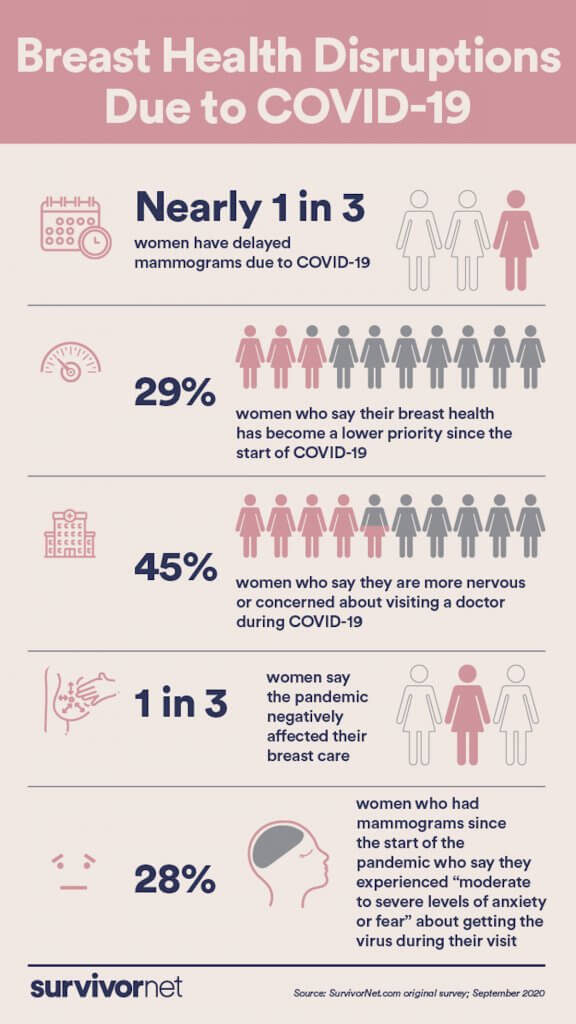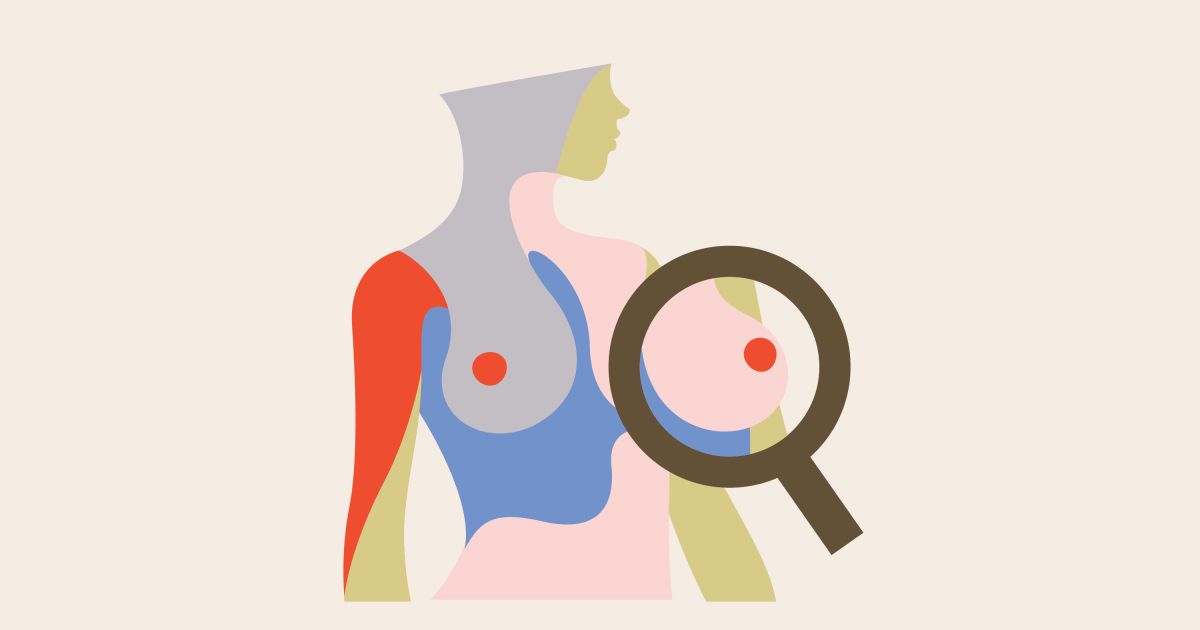Breast Health Disrupted By COVID-19
- 1 in 3 women have delayed their annual mammograms due to the outbreak, and 45% are nervous to visit their physician.
- 29% of women surveyed by SurvivorNet say that since the pandemic they have been neglecting their health when it comes to breast cancer prevention.
- Experts tell SurvivorNet that most facilities now have good protocols to protect patients getting mammograms.
- It is vital to consult your doctor about mammograms, or any other preventative test, because prevention works.
In anticipation of Breast Cancer Awareness Month, SurvivorNet wanted to see if women were still taking the preventive measures needed around their breast health. We surveyed 535 women across the United States to see whether COVID-19 has disrupted their medical care. Turns out, it has.
Read More
Fear of Visiting Their Doctor
"Cancer hasn't gone away, just because we're in the middle of a pandemic," says Dr. Elizabeth Comen, an oncologist from the Memorial Sloan Cancer Center who spoke to SurvivorNet previously about the fear which some women have when getting screened during COVID-19. “However, many elective procedures and preventive services such as mammograms, colonoscopies and Pap smears may have been delayed for a few months in order to limit the number of patients coming into a facility.” Most facilities that do screenings have resumed normal operations and have taken the necessary precautions to keep patients safe.Still, when we saw how many women expressed a fear of COVID-19, we understood. 45% of women revealed to SurvivorNet that since the outbreak they are nervous or concerned when visiting their physician. Numerous experts have assured the SurvivorNet community that facilities are making sure their spaces are safe to visit; but women are worried.
Breast Health Is a Lower Priority
Your health should always be a priority, but anxiety surrounding COVID-19 has made people reevaluate taking key preventative measures to ensure their future well-being. 1 in 3 women acknowledge that COVID-19 has negatively impacted breast care, and 29% of those surveyed admit their breast health has become a lower priority since the beginning of the outbreak. It’s understandable that fear about this virus may make you question your priorities, but we can’t let this slip or we could regret it later.
Increased Anxiety During Mammograms
Not only are women afraid to visit the doctor, but the survey found that 28% of women who continued with their annual mammograms during COVID-19 experienced “moderate to severe” anxiety during the process because of the fear of being exposed to COVID-19. Mammograms are a simple and easy procedure, but the stress of possibly being diagnosed with breast cancer can weigh heavily on women. Add that on top of the outbreak, and nerves can be very high. However, physicians have adjusted quickly to new guidelines brought on by the virus and know the right safety measures to take. Plus, if you are at risk of breast cancer, delaying that mammogram can have a huge consequence down the line.
In many cases, not visiting your doctor and delaying scheduled screenings can lead to cancer diagnoses going undetected. A recent study from Jama Network found that there has been a severe decrease in new cancer diagnoses, including a nearly 52% drop in breast cancer cases. This is likely due to missed mammograms.
Breast Cancer Prevention: Know The Facts
Experts say time and time again that getting a mammogram is the most effective tool in detecting breast cancer, but that doesn’t mean you can’t do a check yourself, in addition to your annual screening. It’s worth noting that the American Cancer Society (ACS) says there’s no clear benefit from breast self-exams, but it allows women to get to know their breasts and possibly detect any lumps or areas that don’t feel normal. Plus, women of any age can perform breast-self exams in the comfort of their own home.
Currently, guidelines suggest women start scheduling mammograms at the age of 45 and continue until their 54-years-old. However, for women who are considered “high risk,” meaning you have a close relative who has had breast cancer, have the BRCA1 or BRCA2 gene mutation, or have had radiation to the chest area when you were young, it’s recommended women start screening starting at 30.
Diet and lifestyle can also play a role in assessing one’s risk for a breast cancer diagnosis. Everyone enjoys a nice glass of wine every now and then, but be careful, because studies have shown alcohol can increase a woman’s risk. According to the studies collected, women who drink more than 45 grams of alcohol per day (about three drinks) are at higher risk of being diagnosed with breast cancer than non-drinkers.
Related: 6 Common Excuses for Skipping a Mammogram That You Need to Stop Using!
Whether it’s food, alcohol, or exercise, these three factors play a large role in making sure you aren’t at higher risk of a cancer diagnosis. No matter what, prioritize your health and advocate for yourself.
TV legend Joan Lunden talks to SurvivorNet about her breast cancer journey
Subscribe to The First 60, featuring important information from the country’s top oncologists to take control of your diagnosis.
Learn more about SurvivorNet's rigorous medical review process.


